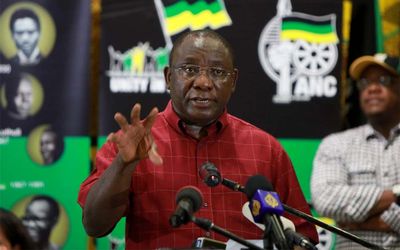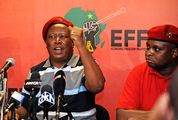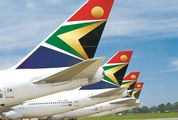SA growth faltering amid difficult challenges, says Ramaphosa
by Wire Staff,
2015-11-21 13:54:14.0
EFFORTS to grow an inclusive economy in South Africa are being undertaken under challenging domestic and international circumstances‚ with growth faltering amid a slowdown in global demand and a dramatic decline in commodity prices‚ Deputy President Cyril Ramaphosa says.
The systemic challenges in the economy — principally‚ the skills deficit and high unemployment rate — were aggravated by energy constraints‚ low levels of domestic savings‚ and increased pressure on public finances‚ he said on Saturday at a meeting with editors from the various media.
Notwithstanding this‚ the government was investing significantly in economic infrastructure‚ expanding energy and water supply‚ improving transport and logistics capabilities‚ and installing broadband across the country.
"Even in difficult economic conditions‚ we are sustaining our investment in schools‚ colleges‚ universities‚ hospitals and clinics," said Mr Ramaphosa.
"We are sustaining spending on social grants‚ housing‚ textbooks‚ antiretrovirals and the many other social interventions needed to tackle poverty and promote development‚" he said.
The government was also committed to acting decisively against those who abused or neglected public resources as it tackled poor administration and inefficiency
"Government is constantly facilitating interaction between South African businesses and their counterparts abroad.
"Our government-to-government relations are these days invariably accompanied by business-to-business engagement.
"We do this because we want South African businesses to succeed at home and abroad‚ and we want to ensure that South Africans enjoy the practical benefits of our extensive interaction with the world‚" Mr Ramaphosa said.
But‚ he said‚ social partnerships were critical to the success of these endeavours. No government anywhere in the world could achieve these goals alone.
"We therefore continue to promote co-operation and collaboration‚ whether it be in the higher education space‚ in health care or in the labour market.
"As an example‚ we are currently engaged in a dialogue with our social partners in Nedlac (National Economic Development and Labour Council) on the introduction of a national minimum wage.
"These discussions are at an advanced stage‚ with agreement having been reached on key principles and mechanisms," the deputy president said.
As this process nears its conclusion‚ the government is having to confront challenging and difficult questions about the level at which the minimum wage should be set and the process by which that determination should be made.
"In many ways‚ we are entering a phase of engagement not unlike the negotiations that led to the adoption of our democratic Constitution‚" Mr Ramaphosa said.
He said that there were still areas of difference and competing interests that needed to be accommodated.
"And yet‚ there is a shared determination to find a solution that advances our efforts to both grow the economy and improve the lives of workers which will lead to lower levels of inequality. There is a commitment to find common ground.
"By crafting a meaningful a national minimum wage we have an opportunity to address income inequality. We also have an opportunity to stabilise our labour environment‚ and‚ above all‚ to advance our national interest‚" Mr Ramaphosa said.
TMG Digital

Cyril Ramaphosa. Picture: SUNDAY TIMES
EFFORTS to grow an inclusive economy in South Africa are being undertaken under challenging domestic and international circumstances‚ with growth faltering amid a slowdown in global demand and a dramatic decline in commodity prices‚ Deputy President Cyril Ramaphosa says.
The systemic challenges in the economy — principally‚ the skills deficit and high unemployment rate — were aggravated by energy constraints‚ low levels of domestic savings‚ and increased pressure on public finances‚ he said on Saturday at a meeting with editors from the various media.
Notwithstanding this‚ the government was investing significantly in economic infrastructure‚ expanding energy and water supply‚ improving transport and logistics capabilities‚ and installing broadband across the country.
"Even in difficult economic conditions‚ we are sustaining our investment in schools‚ colleges‚ universities‚ hospitals and clinics," said Mr Ramaphosa.
"We are sustaining spending on social grants‚ housing‚ textbooks‚ antiretrovirals and the many other social interventions needed to tackle poverty and promote development‚" he said.
The government was also committed to acting decisively against those who abused or neglected public resources as it tackled poor administration and inefficiency
"Government is constantly facilitating interaction between South African businesses and their counterparts abroad.
"Our government-to-government relations are these days invariably accompanied by business-to-business engagement.
"We do this because we want South African businesses to succeed at home and abroad‚ and we want to ensure that South Africans enjoy the practical benefits of our extensive interaction with the world‚" Mr Ramaphosa said.
But‚ he said‚ social partnerships were critical to the success of these endeavours. No government anywhere in the world could achieve these goals alone.
"We therefore continue to promote co-operation and collaboration‚ whether it be in the higher education space‚ in health care or in the labour market.
"As an example‚ we are currently engaged in a dialogue with our social partners in Nedlac (National Economic Development and Labour Council) on the introduction of a national minimum wage.
"These discussions are at an advanced stage‚ with agreement having been reached on key principles and mechanisms," the deputy president said.
As this process nears its conclusion‚ the government is having to confront challenging and difficult questions about the level at which the minimum wage should be set and the process by which that determination should be made.
"In many ways‚ we are entering a phase of engagement not unlike the negotiations that led to the adoption of our democratic Constitution‚" Mr Ramaphosa said.
He said that there were still areas of difference and competing interests that needed to be accommodated.
"And yet‚ there is a shared determination to find a solution that advances our efforts to both grow the economy and improve the lives of workers which will lead to lower levels of inequality. There is a commitment to find common ground.
"By crafting a meaningful a national minimum wage we have an opportunity to address income inequality. We also have an opportunity to stabilise our labour environment‚ and‚ above all‚ to advance our national interest‚" Mr Ramaphosa said.
TMG Digital
























Data supplied by Profile Data
Data supplied by Profile Data
Data supplied by Profile Data
Data supplied by Profile Data